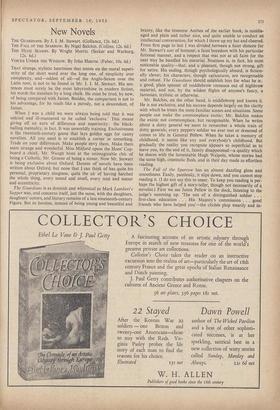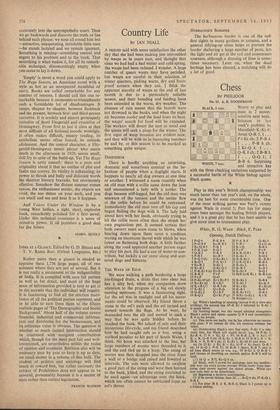New Novels
THE GUARDIANS. By J. I. M. Stewart. (Gollancz, 12s. 6d.)
12s. 6d.) VOICES UNDER THE WINDOW. By John Hearne. (Faber, 10s. 6d.) THAT strange, stylistic heartiness that insists on the moral superi- ority of the short word over the long one, of simplicity over complexity, and—oddest of all—of the Anglo-Saxon over the Latin root, is not to be found in Mr. J. I. M. Stewart. His sen- tences must surely be the most labyrinthine in modern fiction, his words the stateliest by a long chalk. He must be tired, by now, of being compared with James. Besides, the comparison is not to his advantage, for he reads like a parody, not a descendant, of James.
When I was a child we were always being told that it was unkind and ill-mannered to be called 'exclusive.' This meant giving off an aura of difference and superiority : the black- balling mentality, in fact. It was unworldly training. Exclusiveness is the twentieth-century goose that lays golden eggs for canny novelists. All you need is to establish a corner in something. Trade on your differences. Make people envy them. Make them seem strange and wonderful. Miss Mitford opens the Hons' Cup- board a chink, Mr. Waugh hints at the unimaginable chic of being a Catholic, Mr. Greene of being a sinner. Now Mr. Stewart is being exclusive about Oxford. Dozens of novels have been written about Oxford, but none that I can think of has quite his personal, proprietary snugness, quite the air of having hatched the whole thing, every sound and smell, every mist and sunset and eccentricity.
The Guardians is as donnish and whimsical as Mark Lambert's Supper was, and concerns itself, just the same, with the daughters, daughters' suitors, and literary remains of a late nineteenth-century Figure. But its heroine, instead of being young and beautiful and brainy, like the tiresome Anthea of the earlier book, is middle- aged and plain and rather nice, and quite unable to conduct an intellectual conversation, for which I threw up my hat and cheered. From first page to last I was divided between a faint distaste for Mr. Stewart's sort of humour, a faint boredom with his particular fictional manner, and a respect that was not at all faint for the neat way he handled his material. Neatness is, in fact, his most noticeable quality—that, and a pleasant, though not strong, gift for satire. His ending, though psychologically absurd, is fiction- ally clever; his characters, though caricatures, are recognisable and robust. The Guardians should establish him for what he is: a good, plain spinner of middlebrow romance out of highbrow material, and not, by the wildest flights of anyone's fancy, a Jamesian, stylistic or otherwise.
Mr. Balchin, on the other hand, is middlebrow and knows it. He is not exclusive, and his success depends largely on the clarity with which he treats the most familiar scenes and situations. Some people can make the commonplace exotic; Mr. Balchin makes the exotic not commonplace, but recognisable. When he writes about a dotty general we seem to remember a whole train of dotty generals; every peppery soldier we ever met or dreamed of comes to life in General Pellew. When he takes a memory of childhood, it seems like any and everybody's childhood. But gradually the reality you recognise appears so superficial as to leave you, by the end of it, faintly disappointed—a quality which he shares with the lamentable Hugh Walpole, whose stories had the same high, cinematic flush, and in their day made as effortless reading.
The Full of the Sparrow has an almost dazzling gloss and smoothness. Easily, painlessly, it slips down, and you cannot stop reading it. (I do not say this to sneer. To keep you reading is per- haps the highest gift of a story-teller, though not necessarily of a novelist.) First we see Jason Pellew in the dock, listening to the judge's summing up. 'The son of a distinguished soldier . . . first-class education . . . His Majesty's commission . . . good friends who have helped you'—the clichés plop wearily and in-
accurately into the unsympathetic court. Then we go backwards and discover the truth or lies behind each phrase; we nose all round him but — attractive, exasperating, inviolable little man — he stands isolated and we remain ignorant. Something is missing—something central and urgent to his problem and to the book. That something is what makes it, for all its remark- able technique, disconcertingly empty when you come to lay it down.
'Empty' is never a word you could apply to The Huge Season, an American novel with a style as hot as an unexpected mouthful of curry; Books are called remarkable for any number of reasons. I should call this one re- markable because it surmounts so triumphantly such a formidable lot of disadvantages. It jumps, chapter by chapter, between flashback and the present, between first- and third-person narrative. It is crudely and almost grotesquely imitative of Scott Fitzgerald and evocative of Hemingway. From first to last it aims at that most difficult of all fictional moods, nostalgia. It often makes difficult, uneasy reading, its symbolism seems often forced, its attitude adolescent. And the central character, a Fitz- gerald-Hemingway tennis player who meets death in the afternoon in 1929, seems small, dull fry in spite of the build-up. Yet The Huge Season is aptly named : there is a pace and originality about it that no outline of plot and faults can convey. Its vitality is exhausting; its power to thrash and bully and dislocate words the sheerest literary bravado, but enormously effective. Somehow the distant summer comes across, the enthusiasms matter, the objects are vivid, the sun shines on your neck, and you can smell and see and hear it as it happens.
And Voices Under the Window is by a young West Indian, a tight, short, explosive book, remarkably polished for a first novel. Under this technical assurance is a sense of reined-in power. A all promises a good deal for the future.
ISABEL QUIOLY
*



































 Previous page
Previous page